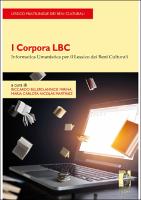I Corpora LBC
Informatica Umanistica per il Lessico dei Beni Culturali
| dc.contributor.editor | BILLERO, RICCARDO | |
| dc.contributor.editor | Farina, Annick | |
| dc.contributor.editor | Nicolás Martínez, María Carlota | |
| dc.date.accessioned | 2022-05-31T10:34:18Z | |
| dc.date.available | 2022-05-31T10:34:18Z | |
| dc.date.issued | 2020 | |
| dc.identifier | ONIX_20220531_9788855182539_870 | |
| dc.identifier | OCN: 1326041325 | |
| dc.identifier.issn | 2704-5870 | |
| dc.identifier.uri | https://library.oapen.org/handle/20.500.12657/55586 | |
| dc.language | Italian | |
| dc.relation.ispartofseries | Strumenti per la didattica e la ricerca | |
| dc.subject.other | digital humanities | |
| dc.subject.other | corpus linguistics | |
| dc.subject.other | cultural heritage | |
| dc.subject.other | lexicon | |
| dc.subject.other | terminology | |
| dc.title | I Corpora LBC | |
| dc.title.alternative | Informatica Umanistica per il Lessico dei Beni Culturali | |
| dc.type | book | |
| oapen.abstract.otherlanguage | Nowadays, lexicographical studies require an interaction with Digital Humanities. This volume presents the genesis and structure of the LBC database, a digital work support tool developed by the Multilanguage Cultural Heritage Lexicon Research Unit under the aegis of the University of Florence, which allows to carry out text research in six different digital corpora (French, English, Italian, Russian, Spanish, German). The authors illustrate the specificities of each corpus in terms of the chosen sources and propose lexicographical and translational uses. | |
| oapen.identifier.doi | 10.36253/978-88-5518-253-9 | |
| oapen.relation.isPublishedBy | bf65d21a-78e5-4ba2-983a-dbfa90962870 | |
| oapen.relation.isbn | 9788855182539 | |
| oapen.relation.isbn | 9788855182522 | |
| oapen.relation.isbn | 9788855182553 | |
| oapen.series.number | 218 | |
| oapen.pages | 130 | |
| oapen.place.publication | Florence |

